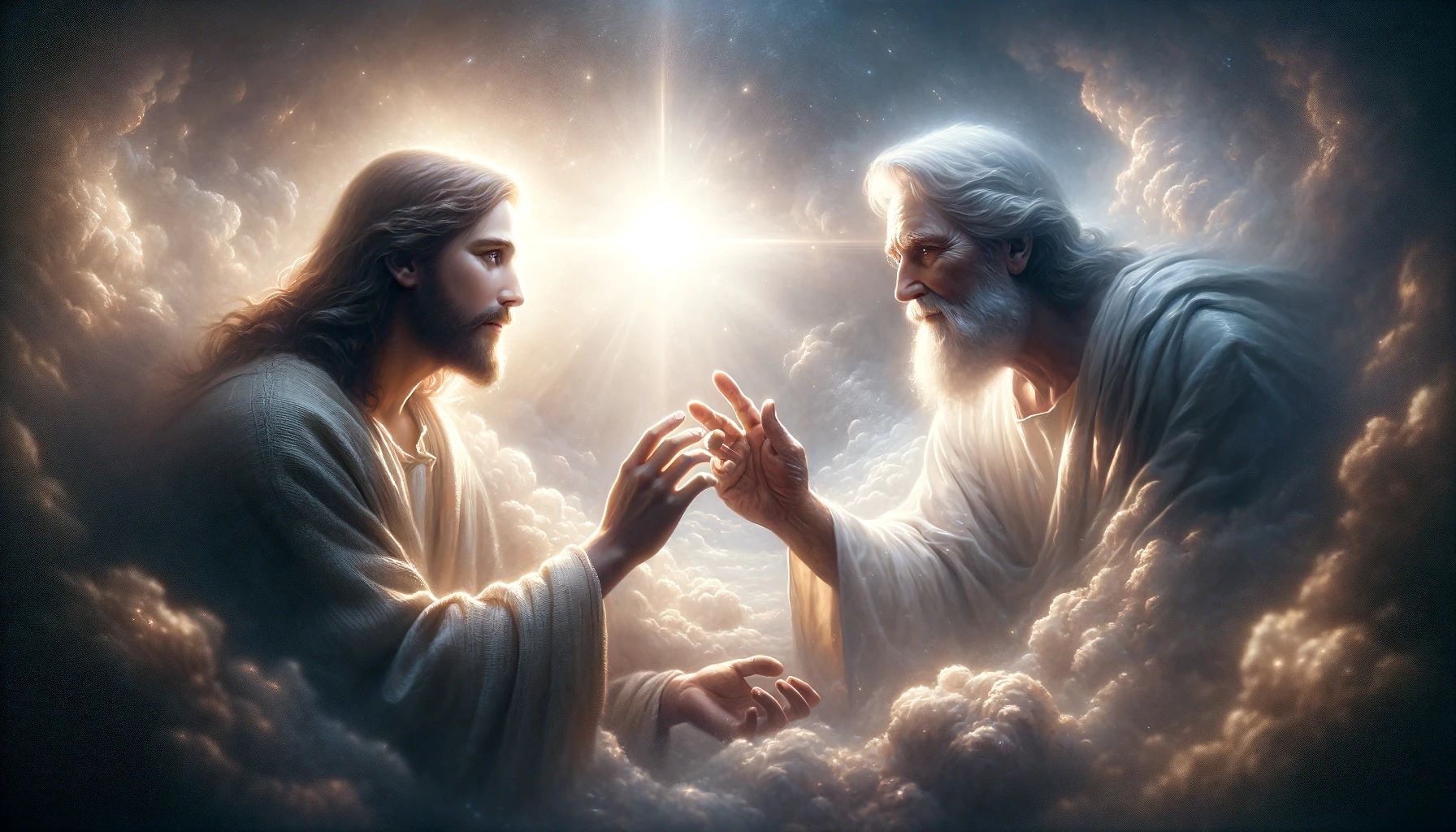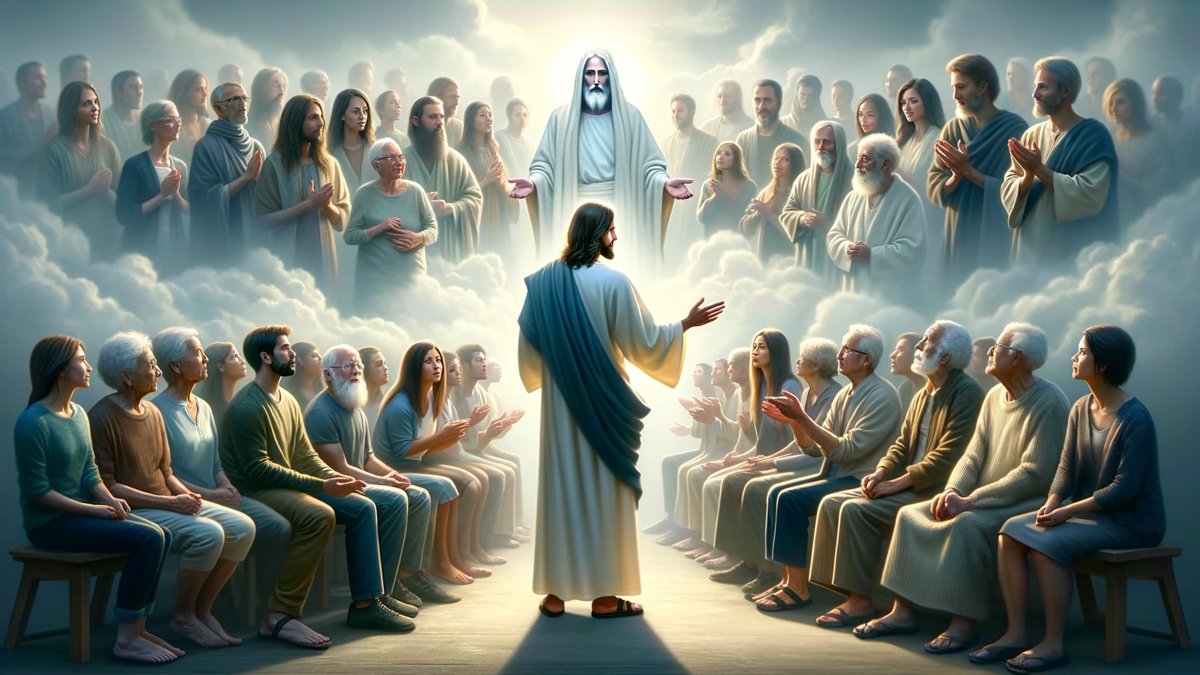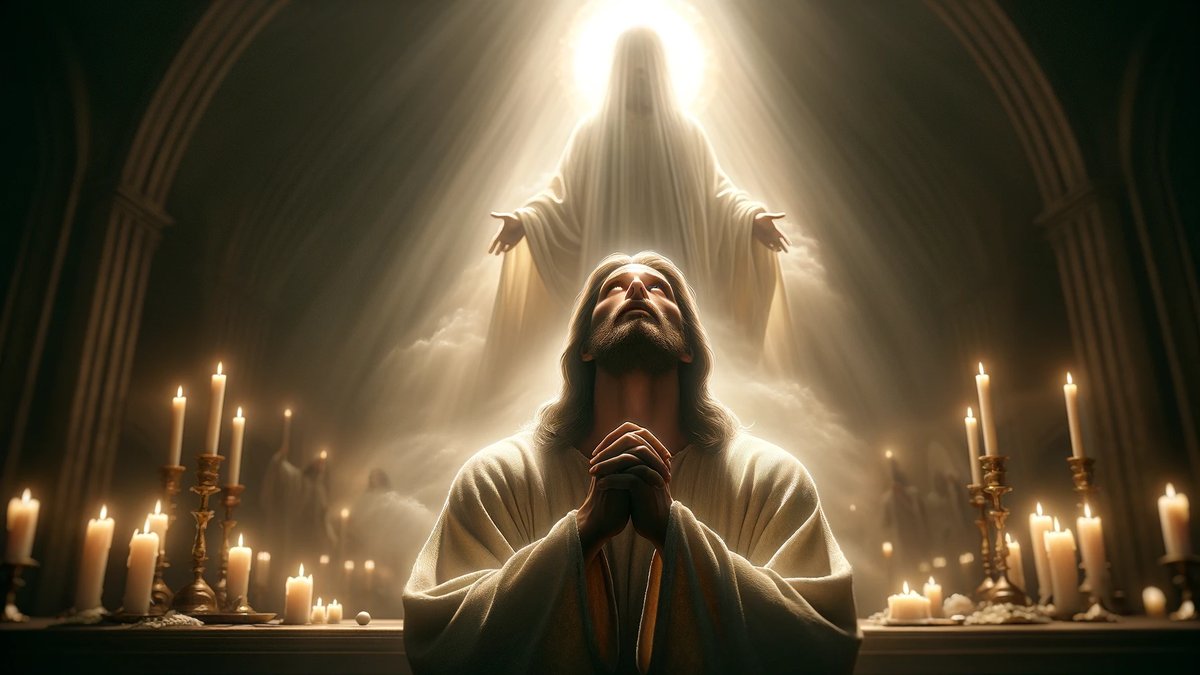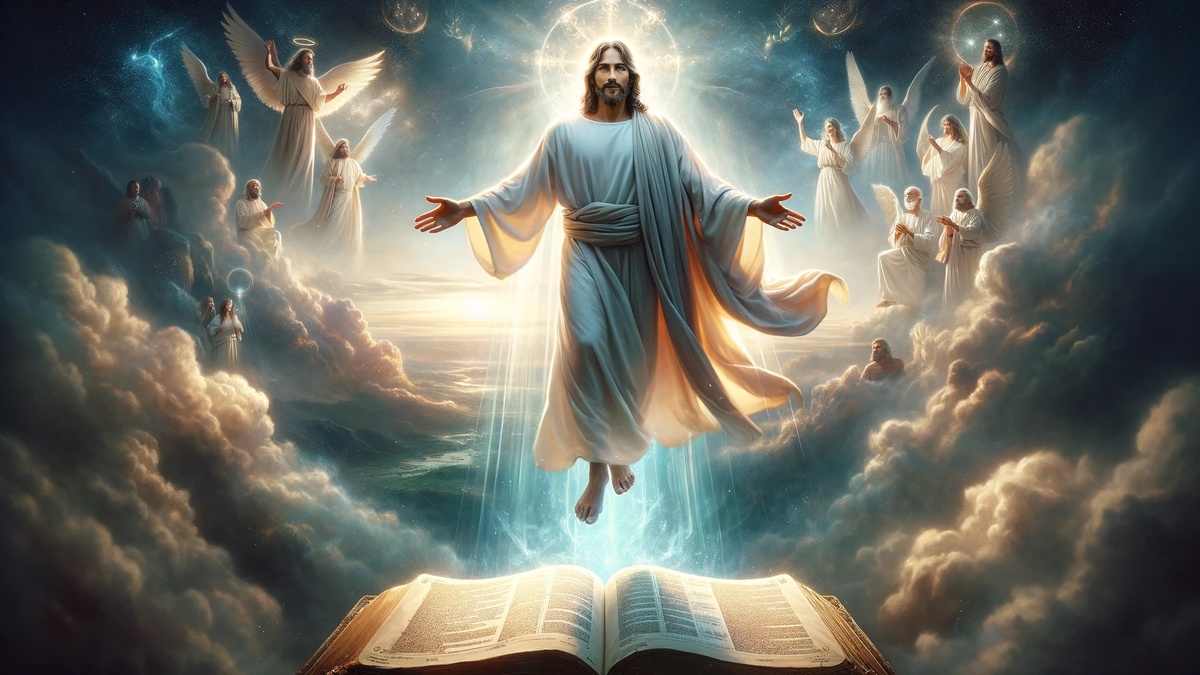Home>Theology and Spirituality>How Can Jesus Be Son Of God And Second Person Of Trinity


Theology and Spirituality
How Can Jesus Be Son Of God And Second Person Of Trinity
Published: February 18, 2024
Jason DeRose, Managing Editor at Christian.net, uses his expertise in religion and journalism to deepen understanding of faith's societal impacts. His editorial leadership, coupled with a strong academic background, enriches the platform’s diverse content, earning him recognition in both journalism and religious circles.
Explore the theological concept of Jesus as the Son of God and the Second Person of the Trinity. Gain insights into theology and spirituality with this in-depth exploration.
(Many of the links in this article redirect to a specific reviewed product. Your purchase of these products through affiliate links helps to generate commission for Christian.net, at no extra cost. Learn more)
Table of Contents
Introduction
The concept of the Trinity, particularly the relationship between Jesus Christ as the Son of God and the second person of the Trinity, is a profound and central aspect of Christian theology. It delves into the very nature of God and the intricate dynamics within the Godhead. Understanding how Jesus can be both the Son of God and the second person of the Trinity requires a deep exploration of biblical teachings, theological insights, and historical perspectives.
This article aims to unravel the complexities surrounding this theological enigma, shedding light on the interconnectedness of the Father, the Son, and the Holy Spirit within the Trinity. By delving into the biblical foundations and theological interpretations, we will gain a deeper understanding of the divine nature of Jesus Christ and his pivotal role within the Trinity.
As we embark on this exploration, it's essential to approach the topic with an open mind and a willingness to engage with the profound mysteries that underpin the Christian faith. Through a thoughtful and comprehensive examination, we can navigate the intricacies of the Trinity and gain a richer comprehension of how Jesus embodies the dual nature of being the Son of God and the second person of the Trinity.
Read more: Why Is Jesus Christ The Son Of God
Understanding the concept of the Trinity
The concept of the Trinity lies at the heart of Christian theology, encapsulating the belief in the triune nature of God. It asserts that God exists as three distinct persons—Father, Son, and Holy Spirit—while being one God. This theological doctrine is not explicitly articulated in the Bible but is derived from the collective teachings and narratives found within the scriptures.
The Trinity embodies a divine mystery that transcends human comprehension, challenging believers to grapple with the complexities of God's nature. It is often analogized through metaphors such as the three states of water (solid, liquid, gas) or the sun (source of light, heat, and radiation), yet these comparisons fall short in encapsulating the full depth of the Trinity.
The Father, as the first person of the Trinity, represents the creator and sustainer of the universe. The Son, Jesus Christ, as the second person, embodies the incarnation of God in human form, serving as the savior and mediator between God and humanity. The Holy Spirit, the third person, is the divine presence that permeates the world, guiding, comforting, and empowering believers.
The Trinity is not a belief in three gods, nor a belief that each person of the Trinity is one-third of God. Instead, it asserts that each person is fully God, co-equal and co-eternal, distinct yet inseparable. This intricate interplay of unity and diversity within the Godhead reflects the depth of divine love and relationship.
Throughout history, the concept of the Trinity has sparked intense theological debates and controversies, leading to the formulation of creeds and doctrines to articulate and safeguard its integrity. The Council of Nicaea in 325 AD and the Council of Constantinople in 381 AD played pivotal roles in defining the orthodox understanding of the Trinity, affirming the divinity of the Son and the Holy Spirit.
In essence, the Trinity serves as a foundational doctrine that shapes Christian worship, prayer, and understanding of God. It invites believers to embrace the mystery of God's triune nature, fostering a profound sense of awe and reverence for the divine unity and diversity encapsulated within the Father, the Son, and the Holy Spirit.
Exploring the biblical basis for Jesus being the Son of God
The biblical foundation for Jesus being the Son of God is deeply rooted in both the Old and New Testaments, weaving a rich tapestry of prophetic insights, historical narratives, and theological revelations. Throughout the scriptures, numerous passages and accounts affirm the divine nature of Jesus Christ as the Son of God, illuminating his unique relationship with the Father and his pivotal role in the redemption of humanity.
In the Old Testament, prophetic glimpses foreshadow the coming of the Messiah, depicting him as the Son of God who would bring salvation and establish an everlasting kingdom. Psalm 2:7 declares, "I will tell of the decree: The Lord said to me, 'You are my Son; today I have begotten you.'" This prophetic utterance points to the divine lineage and exalted status of the coming Messiah as the Son of God.
Furthermore, the book of Isaiah unveils profound prophecies regarding the birth and mission of the Messiah, emphasizing his divine nature and redemptive purpose. Isaiah 9:6 heralds, "For to us a child is born, to us a son is given; and the government shall be upon his shoulder, and his name shall be called Wonderful Counselor, Mighty God, Everlasting Father, Prince of Peace." These prophetic declarations underscore the transcendent identity of the anticipated Son of God, who would bring divine counsel, embody the attributes of God, and usher in an era of peace and righteousness.
In the New Testament, the identity of Jesus as the Son of God is unequivocally affirmed, resonating throughout the Gospels, epistles, and the book of Revelation. The Gospel of John, in particular, expounds on the divine nature of Jesus, portraying him as the eternal Word who was with God and was God from the beginning (John 1:1). This profound declaration encapsulates the preexistence and divine essence of Jesus as the Son of God, intricately intertwined with the Father in the eternal fellowship of the Trinity.
Moreover, the baptism of Jesus serves as a pivotal moment that unveils his divine sonship, as the heavens open, and the voice of the Father resonates, proclaiming, "This is my beloved Son, with whom I am well pleased" (Matthew 3:17). This divine affirmation solidifies Jesus' identity as the Son of God, marking the commencement of his earthly ministry and redemptive mission.
In essence, the biblical narrative resounds with the resplendent truth of Jesus being the Son of God, weaving together prophecies, historical accounts, and theological revelations to illuminate his divine nature, redemptive mission, and intimate relationship with the Father within the intricate tapestry of the Trinity.
Examining the relationship between Jesus and the Father in the Trinity
The relationship between Jesus and the Father within the Trinity encapsulates a profound interplay of divine love, unity, and purpose. At the core of this relationship lies an eternal bond that transcends human understanding, reflecting the inseparable oneness of the Father and the Son within the triune nature of God.
Central to understanding this relationship is the concept of eternal generation, which denotes the timeless and uncaused existence of the Son in relation to the Father. Within the Trinity, the Father begets the Son in a manner that transcends earthly notions of procreation, signifying an eternal and unchanging reality. This divine begetting underscores the eternal coexistence and unity of the Father and the Son, establishing a relationship characterized by perfect harmony and shared divinity.
The Gospel of John provides profound insights into the intimate relationship between Jesus and the Father, portraying the Son as the perfect revelation of the Father's nature and will. Jesus himself declares, "I and the Father are one" (John 10:30), emphasizing the inseparable unity and shared divine essence between them. This unity is further exemplified in Jesus' fervent prayer for his disciples, expressing his desire for them to partake in the same divine unity that he shares with the Father (John 17:21).
Furthermore, the relationship between Jesus and the Father is intricately intertwined with the redemptive mission of Christ. As the Son of God incarnate, Jesus willingly submits to the will of the Father, exemplifying perfect obedience and humility. This submission culminates in the pivotal events of the crucifixion and resurrection, where Jesus fulfills the Father's redemptive plan, reconciling humanity to God through his sacrificial atonement.
The Trinity, as exemplified through the relationship between Jesus and the Father, serves as a divine model of unity, love, and mutual honor. It invites believers into a profound communion with the triune God, fostering a deep sense of awe and reverence for the eternal bond shared between the Father, the Son, and the Holy Spirit.
In essence, the relationship between Jesus and the Father within the Trinity epitomizes the perfect unity and divine love that characterize the Godhead, offering profound insights into the eternal dynamics of the Father-Son relationship and its implications for humanity's redemption.
The role of Jesus as the second person of the Trinity
The role of Jesus as the second person of the Trinity is pivotal in elucidating the divine dynamics within the Godhead and the redemptive narrative of humanity. As the eternal Word incarnate, Jesus embodies the fullness of deity while engaging intimately with the human experience, serving as the bridge between the transcendent realm of God and the temporal realm of humanity.
Central to Jesus' role as the second person of the Trinity is his incarnation, where the eternal Son willingly takes on human flesh, entering into the complexities of human existence while retaining his divine nature. This profound act of condescension demonstrates the depth of God's love and the divine initiative to reconcile humanity to Himself. Through the incarnation, Jesus becomes the tangible expression of God's grace and truth, dwelling among humanity to reveal the Father's heart and to effectuate the plan of redemption.
Furthermore, Jesus' role encompasses his redemptive mission, culminating in his sacrificial death and triumphant resurrection. As the Lamb of God, he offers himself as the ultimate atoning sacrifice, bearing the weight of humanity's sin and reconciling humanity to God. This act of divine love and selflessness exemplifies the profound depths of the Son's commitment to fulfilling the Father's redemptive plan, bringing about the restoration of broken communion between God and humanity.
Moreover, as the second person of the Trinity, Jesus serves as the divine mediator and advocate for humanity, interceding on behalf of believers and offering the gift of salvation. His role as the mediator between God and humanity underscores the inseparable bond between the Father and the Son, as well as the compassionate outreach of God to reconcile and restore fallen humanity to Himself.
In essence, the role of Jesus as the second person of the Trinity encapsulates the divine initiative to redeem and restore humanity, serving as the embodiment of God's love, grace, and truth. His unique position within the Trinity underscores the profound unity and diversity within the Godhead, offering believers a glimpse into the unfathomable depths of God's redemptive plan and the eternal significance of Jesus' role as the Son of God.
Addressing common misconceptions and objections
Misconceptions and objections surrounding the concept of Jesus being the Son of God and the second person of the Trinity often stem from a lack of comprehensive understanding of Christian theology and the intricacies of the divine nature. Addressing these misconceptions and objections is crucial in fostering clarity and dispelling misunderstandings that may hinder a deeper appreciation of the profound truths encapsulated within the Trinity.
One common misconception revolves around the belief that the Trinity implies the existence of three separate gods. However, the doctrine of the Trinity affirms the oneness of God while acknowledging the distinct persons of the Father, the Son, and the Holy Spirit. This divine unity and diversity within the Godhead defy simplistic categorizations and call for a nuanced understanding of the triune nature of God.
Another misconception pertains to the notion that Jesus, as the Son of God, is subordinate or inferior to the Father within the Trinity. However, orthodox Christian theology maintains the co-equality and co-eternality of the Father, the Son, and the Holy Spirit, emphasizing their shared divine essence and unity. The Son's submission to the Father in the redemptive narrative does not diminish his divine nature but exemplifies the perfect harmony and relational dynamics within the Trinity.
Furthermore, objections may arise regarding the comprehensibility of the Trinity, with some asserting that it is an incomprehensible or contradictory concept. While the Trinity indeed transcends human comprehension, it does not entail logical contradiction. Rather, it invites believers to embrace the mystery of God's triune nature, recognizing that divine truths may surpass human intellect while remaining internally consistent within the framework of Christian faith.
In addressing these misconceptions and objections, it is essential to approach the concept of the Trinity with humility and a willingness to engage with the depth of Christian theology. Embracing the mystery of the Trinity fosters a profound sense of awe and reverence for the divine unity and diversity encapsulated within the Father, the Son, and the Holy Spirit, inviting believers into a deeper communion with the triune God.
In essence, navigating misconceptions and objections surrounding the Trinity calls for a balanced approach that upholds the integrity of Christian doctrine while fostering a spirit of open dialogue and understanding. By engaging with these complexities, believers can cultivate a richer comprehension of the divine nature of Jesus Christ and his pivotal role within the Trinity.
Conclusion
In conclusion, the intricate relationship between Jesus as the Son of God and the second person of the Trinity unveils profound truths that resonate at the core of Christian faith and theology. Through a comprehensive exploration of the biblical foundations, theological insights, and historical perspectives, we have gained a deeper understanding of the divine nature of Jesus Christ and his pivotal role within the Trinity.
The concept of the Trinity, encapsulating the eternal unity and diversity of the Father, the Son, and the Holy Spirit, serves as a foundational doctrine that shapes Christian belief and understanding of God. It invites believers to embrace the mystery of God's triune nature, fostering a profound sense of awe and reverence for the divine unity and diversity within the Godhead.
The biblical narrative resounds with the resplendent truth of Jesus being the Son of God, weaving together prophecies, historical accounts, and theological revelations to illuminate his divine nature, redemptive mission, and intimate relationship with the Father within the intricate tapestry of the Trinity.
The relationship between Jesus and the Father within the Trinity epitomizes the perfect unity and divine love that characterize the Godhead, offering profound insights into the eternal dynamics of the Father-Son relationship and its implications for humanity's redemption.
Furthermore, the role of Jesus as the second person of the Trinity encapsulates the divine initiative to redeem and restore humanity, serving as the embodiment of God's love, grace, and truth. His unique position within the Trinity underscores the profound unity and diversity within the Godhead, offering believers a glimpse into the unfathomable depths of God's redemptive plan and the eternal significance of Jesus' role as the Son of God.
Addressing common misconceptions and objections surrounding the Trinity is crucial in fostering clarity and dispelling misunderstandings that may hinder a deeper appreciation of the profound truths encapsulated within the Trinity. Embracing the mystery of the Trinity fosters a profound sense of awe and reverence for the divine unity and diversity encapsulated within the Father, the Son, and the Holy Spirit, inviting believers into a deeper communion with the triune God.
In essence, the exploration of Jesus as the Son of God and the second person of the Trinity invites believers to delve into the depths of Christian theology, embracing the profound mysteries that underpin the Christian faith. Through this journey of discovery, we are beckoned to contemplate the unfathomable love, grace, and unity that emanate from the heart of the triune God, inviting us into a deeper communion with the divine and transformative truths encapsulated within the Father, the Son, and the Holy Spirit.














